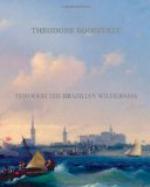All such enemies, however, he regarded as utterly trivial compared to the real dangers of the wilderness—the torment and menace of attacks by the swarming insects, by mosquitoes and the even more intolerable tiny gnats, by the ticks, and by the vicious poisonous ants which occasionally cause villages and even whole districts to be deserted by human beings. These insects, and the fevers they cause, and dysentery and starvation and wearing hardship and accidents in rapids are what the pioneer explorers have to fear. The conversation was to me most interesting. The colonel spoke French about to the extent I did; but of course he and the others preferred Portuguese; and then Kermit was the interpreter.
In the evening, soon after moonrise, we stopped for wood at the little Brazilian town of Porto Martinho. There are about twelve hundred inhabitants. Some of the buildings were of stone; a large private house with a castellated tower was of stone; there were shops, and a post-office, stores, a restaurant and billiard-hall, and warehouses for matte, of which much is grown in the region roundabout. Most of the houses were low, with overhanging, sloping caves; and there were gardens with high walls, inside of which trees rose, many of them fragrant. We wandered through the wide, dusty streets, and along the narrow sidewalks. It was a hot, still evening; the smell of the tropics was on the heavy December air. Through the open doors and windows we caught dim glimpses of the half-clad inmates of the poorer houses; women and young girls sat outside their thresholds in the moonlight. All whom we met were most friendly: the captain of the little Brazilian garrison; the intendente, a local trader; another trader and ranchman, a Uruguayan, who had just received his newspaper containing my speech in Montevideo, and who, as I gathered from what I understood of his rather voluble Spanish, was much impressed by my views on democracy, honesty, liberty, and order (rather well-worn topics); and a Catalan who spoke French, and who was accompanied by his pretty daughter, a dear little girl of eight or ten, who said with much pride that she spoke three languages—Brazilian, Spanish, and Catalan! Her father expressed strongly his desire for a church and for a school in the little city.
When at last the wood was aboard we resumed our journey. The river was like glass. In the white moonlight the palms on the edge of the banks stood mirrored in the still water. We sat forward and as we rounded the curves the long silver reaches of the great stream stretched ahead of us, and the ghostly outlines of hills rose in the distance. Here and there prairie fires burned, and the red glow warred with the moon’s radiance.




